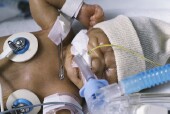
MONDAY, July 30 (HealthDay News) — Children born with a heart defect should undergo early evaluation, immediate treatment and ongoing follow-up for related developmental disorders affecting brain function, according to a new American Heart Association scientific statement.
The statement also identifies, for the first time, conditions that increase the risk of developmental disorders among children with such birth defects, also called congenital heart defects.
These conditions include undergoing open heart surgery in infancy, having a congenital heart defect that causes a child to have a chronically blue appearance, or a combination of congenital heart disease and one of the following issues: premature birth; developmental delay as a baby; suspected genetic abnormality or syndrome; history of mechanical support to help the heart; heart transplantation; a history of cardiopulmonary resuscitation; prolonged hospitalization during the child’s heart care; seizures related to heart surgery; and brain abnormalities noted on brain imaging.
The statement, published July 30 in the journal Circulation, was approved by the American Academy of Pediatrics.
Each year in the United States, about 36,000 infants (nine of every 1,000) are born with a congenital heart defect. Medical advances help most infants with a congenital heart defect survive into adulthood and there are between 1 million and 3 million adult survivors in the United States.
“If we identify developmental problems earlier, we’re going to help prevent issues from coming up in school that prevent these children from achieving their fullest potential,” group co-chair Dr. Bradley Marino, an associate professor of pediatrics at the University of Cincinnati College of Medicine, said in a heart association news release.
“In the past, we were happy if they survived. Now, we want them to survive and thrive,” he added.
Developmental disorders among children with congenital heart defects may appear during childhood or adolescence as: problems in school; poor social skills; physical limitations; speech and language difficulties; and attention, behavior and emotional issues.
“If your child fits the high-risk criteria, go to the physician who coordinates your child’s care to obtain evaluations for neurodevelopmental, psychosocial and behavioral and emotional issues,” said Marino, who is also director of the Heart Institute Research Core and the Heart Institute Neurodevelopmental Clinic at Cincinnati Children’s Hospital Medical Center.
“Your child’s cardiologist should continue to handle the physical issues related to your child’s heart disease, but other caregivers need to join your child’s ‘medical home’ to ensure the best ongoing, comprehensive care,” he added.
A medical home is typically the child’s primary care provider.
More information
The March of Dimes has more about congenital heart defects.

